Some checks failed
Test / lint (push) Has been cancelled
Test / test (pydantic-v1, 3.10) (push) Has been cancelled
Test / test (pydantic-v1, 3.11) (push) Has been cancelled
Test / test (pydantic-v1, 3.12) (push) Has been cancelled
Test / test (pydantic-v1, 3.8) (push) Has been cancelled
Test / test (pydantic-v1, 3.9) (push) Has been cancelled
Test / test (pydantic-v2, 3.10) (push) Has been cancelled
Test / test (pydantic-v2, 3.11) (push) Has been cancelled
Test / test (pydantic-v2, 3.12) (push) Has been cancelled
Test / test (pydantic-v2, 3.8) (push) Has been cancelled
Test / test (pydantic-v2, 3.9) (push) Has been cancelled
Test / coverage-combine (push) Has been cancelled
Test / check (push) Has been cancelled
Issue Manager / issue-manager (push) Has been cancelled
Label Approved / label-approved (push) Has been cancelled
501 lines
24 KiB
Markdown
501 lines
24 KiB
Markdown
<p align="center">
|
||
<a href="https://fastapi.tiangolo.com"><img src="https://fastapi.tiangolo.com/img/logo-margin/logo-teal.png" alt="FastAPI"></a>
|
||
</p>
|
||
<p align="center">
|
||
<em>FastAPI framework, high performance, easy to learn, fast to code, ready for production</em>
|
||
</p>
|
||
<p align="center">
|
||
<a href="https://github.com/fastapi/fastapi/actions?query=workflow%3ATest+event%3Apush+branch%3Amaster" target="_blank">
|
||
<img src="https://github.com/fastapi/fastapi/workflows/Test/badge.svg?event=push&branch=master" alt="Test">
|
||
</a>
|
||
<a href="https://coverage-badge.samuelcolvin.workers.dev/redirect/fastapi/fastapi" target="_blank">
|
||
<img src="https://coverage-badge.samuelcolvin.workers.dev/fastapi/fastapi.svg" alt="Coverage">
|
||
</a>
|
||
<a href="https://pypi.org/project/fastapi" target="_blank">
|
||
<img src="https://img.shields.io/pypi/v/fastapi?color=%2334D058&label=pypi%20package" alt="Package version">
|
||
</a>
|
||
<a href="https://pypi.org/project/fastapi" target="_blank">
|
||
<img src="https://img.shields.io/pypi/pyversions/fastapi.svg?color=%2334D058" alt="Supported Python versions">
|
||
</a>
|
||
</p>
|
||
|
||
---
|
||
|
||
**Documentation**: <a href="https://fastapi.tiangolo.com" target="_blank">https://fastapi.tiangolo.com</a>
|
||
|
||
**Source Code**: <a href="https://github.com/fastapi/fastapi" target="_blank">https://github.com/fastapi/fastapi</a>
|
||
|
||
---
|
||
|
||
FastAPI is a modern, fast (high-performance), web framework for building APIs with Python based on standard Python type hints.
|
||
|
||
The key features are:
|
||
|
||
* **Fast**: Very high performance, on par with **NodeJS** and **Go** (thanks to Starlette and Pydantic). [One of the fastest Python frameworks available](#performance).
|
||
* **Fast to code**: Increase the speed to develop features by about 200% to 300%. *
|
||
* **Fewer bugs**: Reduce about 40% of human (developer) induced errors. *
|
||
* **Intuitive**: Great editor support. <abbr title="also known as auto-complete, autocompletion, IntelliSense">Completion</abbr> everywhere. Less time debugging.
|
||
* **Easy**: Designed to be easy to use and learn. Less time reading docs.
|
||
* **Short**: Minimize code duplication. Multiple features from each parameter declaration. Fewer bugs.
|
||
* **Robust**: Get production-ready code. With automatic interactive documentation.
|
||
* **Standards-based**: Based on (and fully compatible with) the open standards for APIs: <a href="https://github.com/OAI/OpenAPI-Specification" class="external-link" target="_blank">OpenAPI</a> (previously known as Swagger) and <a href="https://json-schema.org/" class="external-link" target="_blank">JSON Schema</a>.
|
||
|
||
<small>* estimation based on tests on an internal development team, building production applications.</small>
|
||
|
||
## Sponsors
|
||
|
||
<!-- sponsors -->
|
||
|
||
<a href="https://cryptapi.io/" target="_blank" title="CryptAPI: Your easy to use, secure and privacy oriented payment gateway."><img src="https://fastapi.tiangolo.com/img/sponsors/cryptapi.svg"></a>
|
||
<a href="https://platform.sh/try-it-now/?utm_source=fastapi-signup&utm_medium=banner&utm_campaign=FastAPI-signup-June-2023" target="_blank" title="Build, run and scale your apps on a modern, reliable, and secure PaaS."><img src="https://fastapi.tiangolo.com/img/sponsors/platform-sh.png"></a>
|
||
<a href="https://www.porter.run" target="_blank" title="Deploy FastAPI on AWS with a few clicks"><img src="https://fastapi.tiangolo.com/img/sponsors/porter.png"></a>
|
||
<a href="https://bump.sh/fastapi?utm_source=fastapi&utm_medium=referral&utm_campaign=sponsor" target="_blank" title="Automate FastAPI documentation generation with Bump.sh"><img src="https://fastapi.tiangolo.com/img/sponsors/bump-sh.svg"></a>
|
||
<a href="https://github.com/scalar/scalar/?utm_source=fastapi&utm_medium=website&utm_campaign=main-badge" target="_blank" title="Scalar: Beautiful Open-Source API References from Swagger/OpenAPI files"><img src="https://fastapi.tiangolo.com/img/sponsors/scalar.svg"></a>
|
||
<a href="https://www.propelauth.com/?utm_source=fastapi&utm_campaign=1223&utm_medium=mainbadge" target="_blank" title="Auth, user management and more for your B2B product"><img src="https://fastapi.tiangolo.com/img/sponsors/propelauth.png"></a>
|
||
<a href="https://docs.withcoherence.com/configuration/frameworks/?utm_medium=advertising&utm_source=fastapi&utm_campaign=docs#fastapi-example" target="_blank" title="Coherence"><img src="https://fastapi.tiangolo.com/img/sponsors/coherence.png"></a>
|
||
<a href="https://www.mongodb.com/developer/languages/python/python-quickstart-fastapi/?utm_campaign=fastapi_framework&utm_source=fastapi_sponsorship&utm_medium=web_referral" target="_blank" title="Simplify Full Stack Development with FastAPI & MongoDB"><img src="https://fastapi.tiangolo.com/img/sponsors/mongodb.png"></a>
|
||
<a href="https://konghq.com/products/kong-konnect?utm_medium=referral&utm_source=github&utm_campaign=platform&utm_content=fast-api" target="_blank" title="Kong Konnect - API management platform"><img src="https://fastapi.tiangolo.com/img/sponsors/kong.png"></a>
|
||
<a href="https://zuplo.link/fastapi-gh" target="_blank" title="Zuplo: Scale, Protect, Document, and Monetize your FastAPI"><img src="https://fastapi.tiangolo.com/img/sponsors/zuplo.png"></a>
|
||
<a href="https://fine.dev?ref=fastapibadge" target="_blank" title="Fine's AI FastAPI Workflow: Effortlessly Deploy and Integrate FastAPI into Your Project"><img src="https://fastapi.tiangolo.com/img/sponsors/fine.png"></a>
|
||
<a href="https://liblab.com?utm_source=fastapi" target="_blank" title="liblab - Generate SDKs from FastAPI"><img src="https://fastapi.tiangolo.com/img/sponsors/liblab.png"></a>
|
||
<a href="https://github.com/deepset-ai/haystack/" target="_blank" title="Build powerful search from composable, open source building blocks"><img src="https://fastapi.tiangolo.com/img/sponsors/haystack-fastapi.svg"></a>
|
||
<a href="https://databento.com/" target="_blank" title="Pay as you go for market data"><img src="https://fastapi.tiangolo.com/img/sponsors/databento.svg"></a>
|
||
<a href="https://speakeasy.com?utm_source=fastapi+repo&utm_medium=github+sponsorship" target="_blank" title="SDKs for your API | Speakeasy"><img src="https://fastapi.tiangolo.com/img/sponsors/speakeasy.png"></a>
|
||
<a href="https://www.svix.com/" target="_blank" title="Svix - Webhooks as a service"><img src="https://fastapi.tiangolo.com/img/sponsors/svix.svg"></a>
|
||
<a href="https://www.codacy.com/?utm_source=github&utm_medium=sponsors&utm_id=pioneers" target="_blank" title="Take code reviews from hours to minutes"><img src="https://fastapi.tiangolo.com/img/sponsors/codacy.png"></a>
|
||
<a href="https://www.stainlessapi.com/?utm_source=fastapi&utm_medium=referral" target="_blank" title="Stainless | Generate best-in-class SDKs"><img src="https://fastapi.tiangolo.com/img/sponsors/stainless.png"></a>
|
||
|
||
<!-- /sponsors -->
|
||
|
||
<a href="https://fastapi.tiangolo.com/fastapi-people/#sponsors" class="external-link" target="_blank">Other sponsors</a>
|
||
|
||
## Opinions
|
||
|
||
"_[...] I'm using **FastAPI** a ton these days. [...] I'm actually planning to use it for all of my team's **ML services at Microsoft**. Some of them are getting integrated into the core **Windows** product and some **Office** products._"
|
||
|
||
<div style="text-align: right; margin-right: 10%;">Kabir Khan - <strong>Microsoft</strong> <a href="https://github.com/fastapi/fastapi/pull/26" target="_blank"><small>(ref)</small></a></div>
|
||
|
||
---
|
||
|
||
"_We adopted the **FastAPI** library to spawn a **REST** server that can be queried to obtain **predictions**. [for Ludwig]_"
|
||
|
||
<div style="text-align: right; margin-right: 10%;">Piero Molino, Yaroslav Dudin, and Sai Sumanth Miryala - <strong>Uber</strong> <a href="https://eng.uber.com/ludwig-v0-2/" target="_blank"><small>(ref)</small></a></div>
|
||
|
||
---
|
||
|
||
"_**Netflix** is pleased to announce the open-source release of our **crisis management** orchestration framework: **Dispatch**! [built with **FastAPI**]_"
|
||
|
||
<div style="text-align: right; margin-right: 10%;">Kevin Glisson, Marc Vilanova, Forest Monsen - <strong>Netflix</strong> <a href="https://netflixtechblog.com/introducing-dispatch-da4b8a2a8072" target="_blank"><small>(ref)</small></a></div>
|
||
|
||
---
|
||
|
||
"_I’m over the moon excited about **FastAPI**. It’s so fun!_"
|
||
|
||
<div style="text-align: right; margin-right: 10%;">Brian Okken - <strong><a href="https://pythonbytes.fm/episodes/show/123/time-to-right-the-py-wrongs?time_in_sec=855" target="_blank">Python Bytes</a> podcast host</strong> <a href="https://twitter.com/brianokken/status/1112220079972728832" target="_blank"><small>(ref)</small></a></div>
|
||
|
||
---
|
||
|
||
"_Honestly, what you've built looks super solid and polished. In many ways, it's what I wanted **Hug** to be - it's really inspiring to see someone build that._"
|
||
|
||
<div style="text-align: right; margin-right: 10%;">Timothy Crosley - <strong><a href="https://www.hug.rest/" target="_blank">Hug</a> creator</strong> <a href="https://news.ycombinator.com/item?id=19455465" target="_blank"><small>(ref)</small></a></div>
|
||
|
||
---
|
||
|
||
"_If you're looking to learn one **modern framework** for building REST APIs, check out **FastAPI** [...] It's fast, easy to use and easy to learn [...]_"
|
||
|
||
"_We've switched over to **FastAPI** for our **APIs** [...] I think you'll like it [...]_"
|
||
|
||
<div style="text-align: right; margin-right: 10%;">Ines Montani - Matthew Honnibal - <strong><a href="https://explosion.ai" target="_blank">Explosion AI</a> founders - <a href="https://spacy.io" target="_blank">spaCy</a> creators</strong> <a href="https://twitter.com/_inesmontani/status/1144173225322143744" target="_blank"><small>(ref)</small></a> - <a href="https://twitter.com/honnibal/status/1144031421859655680" target="_blank"><small>(ref)</small></a></div>
|
||
|
||
---
|
||
|
||
"_If anyone is looking to build a production Python API, I would highly recommend **FastAPI**. It is **beautifully designed**, **simple to use** and **highly scalable**, it has become a **key component** in our API first development strategy and is driving many automations and services such as our Virtual TAC Engineer._"
|
||
|
||
<div style="text-align: right; margin-right: 10%;">Deon Pillsbury - <strong>Cisco</strong> <a href="https://www.linkedin.com/posts/deonpillsbury_cisco-cx-python-activity-6963242628536487936-trAp/" target="_blank"><small>(ref)</small></a></div>
|
||
|
||
---
|
||
|
||
## **Typer**, the FastAPI of CLIs
|
||
|
||
<a href="https://typer.tiangolo.com" target="_blank"><img src="https://typer.tiangolo.com/img/logo-margin/logo-margin-vector.svg" style="width: 20%;"></a>
|
||
|
||
If you are building a <abbr title="Command Line Interface">CLI</abbr> app to be used in the terminal instead of a web API, check out <a href="https://typer.tiangolo.com/" class="external-link" target="_blank">**Typer**</a>.
|
||
|
||
**Typer** is FastAPI's little sibling. And it's intended to be the **FastAPI of CLIs**. ⌨️ 🚀
|
||
|
||
## Requirements
|
||
|
||
FastAPI stands on the shoulders of giants:
|
||
|
||
* <a href="https://www.starlette.io/" class="external-link" target="_blank">Starlette</a> for the web parts.
|
||
* <a href="https://docs.pydantic.dev/" class="external-link" target="_blank">Pydantic</a> for the data parts.
|
||
|
||
## Installation
|
||
|
||
Create and activate a <a href="https://fastapi.tiangolo.com/virtual-environments/" class="external-link" target="_blank">virtual environment</a> and then install FastAPI:
|
||
|
||
<div class="termy">
|
||
|
||
```console
|
||
$ pip install "fastapi[standard]"
|
||
|
||
---> 100%
|
||
```
|
||
|
||
</div>
|
||
|
||
**Note**: Make sure you put `"fastapi[standard]"` in quotes to ensure it works in all terminals.
|
||
|
||
## Example
|
||
|
||
### Create it
|
||
|
||
* Create a file `main.py` with:
|
||
|
||
```Python
|
||
from typing import Union
|
||
|
||
from fastapi import FastAPI
|
||
|
||
app = FastAPI()
|
||
|
||
|
||
@app.get("/")
|
||
def read_root():
|
||
return {"Hello": "World"}
|
||
|
||
|
||
@app.get("/items/{item_id}")
|
||
def read_item(item_id: int, q: Union[str, None] = None):
|
||
return {"item_id": item_id, "q": q}
|
||
```
|
||
|
||
<details markdown="1">
|
||
<summary>Or use <code>async def</code>...</summary>
|
||
|
||
If your code uses `async` / `await`, use `async def`:
|
||
|
||
```Python hl_lines="9 14"
|
||
from typing import Union
|
||
|
||
from fastapi import FastAPI
|
||
|
||
app = FastAPI()
|
||
|
||
|
||
@app.get("/")
|
||
async def read_root():
|
||
return {"Hello": "World"}
|
||
|
||
|
||
@app.get("/items/{item_id}")
|
||
async def read_item(item_id: int, q: Union[str, None] = None):
|
||
return {"item_id": item_id, "q": q}
|
||
```
|
||
|
||
**Note**:
|
||
|
||
If you don't know, check the _"In a hurry?"_ section about <a href="https://fastapi.tiangolo.com/async/#in-a-hurry" target="_blank">`async` and `await` in the docs</a>.
|
||
|
||
</details>
|
||
|
||
### Run it
|
||
|
||
Run the server with:
|
||
|
||
<div class="termy">
|
||
|
||
```console
|
||
$ fastapi dev main.py
|
||
|
||
╭────────── FastAPI CLI - Development mode ───────────╮
|
||
│ │
|
||
│ Serving at: http://127.0.0.1:8000 │
|
||
│ │
|
||
│ API docs: http://127.0.0.1:8000/docs │
|
||
│ │
|
||
│ Running in development mode, for production use: │
|
||
│ │
|
||
│ fastapi run │
|
||
│ │
|
||
╰─────────────────────────────────────────────────────╯
|
||
|
||
INFO: Will watch for changes in these directories: ['/home/user/code/awesomeapp']
|
||
INFO: Uvicorn running on http://127.0.0.1:8000 (Press CTRL+C to quit)
|
||
INFO: Started reloader process [2248755] using WatchFiles
|
||
INFO: Started server process [2248757]
|
||
INFO: Waiting for application startup.
|
||
INFO: Application startup complete.
|
||
```
|
||
|
||
</div>
|
||
|
||
<details markdown="1">
|
||
<summary>About the command <code>fastapi dev main.py</code>...</summary>
|
||
|
||
The command `fastapi dev` reads your `main.py` file, detects the **FastAPI** app in it, and starts a server using <a href="https://www.uvicorn.org" class="external-link" target="_blank">Uvicorn</a>.
|
||
|
||
By default, `fastapi dev` will start with auto-reload enabled for local development.
|
||
|
||
You can read more about it in the <a href="https://fastapi.tiangolo.com/fastapi-cli/" target="_blank">FastAPI CLI docs</a>.
|
||
|
||
</details>
|
||
|
||
### Check it
|
||
|
||
Open your browser at <a href="http://127.0.0.1:8000/items/5?q=somequery" class="external-link" target="_blank">http://127.0.0.1:8000/items/5?q=somequery</a>.
|
||
|
||
You will see the JSON response as:
|
||
|
||
```JSON
|
||
{"item_id": 5, "q": "somequery"}
|
||
```
|
||
|
||
You already created an API that:
|
||
|
||
* Receives HTTP requests in the _paths_ `/` and `/items/{item_id}`.
|
||
* Both _paths_ take `GET` <em>operations</em> (also known as HTTP _methods_).
|
||
* The _path_ `/items/{item_id}` has a _path parameter_ `item_id` that should be an `int`.
|
||
* The _path_ `/items/{item_id}` has an optional `str` _query parameter_ `q`.
|
||
|
||
### Interactive API docs
|
||
|
||
Now go to <a href="http://127.0.0.1:8000/docs" class="external-link" target="_blank">http://127.0.0.1:8000/docs</a>.
|
||
|
||
You will see the automatic interactive API documentation (provided by <a href="https://github.com/swagger-api/swagger-ui" class="external-link" target="_blank">Swagger UI</a>):
|
||
|
||
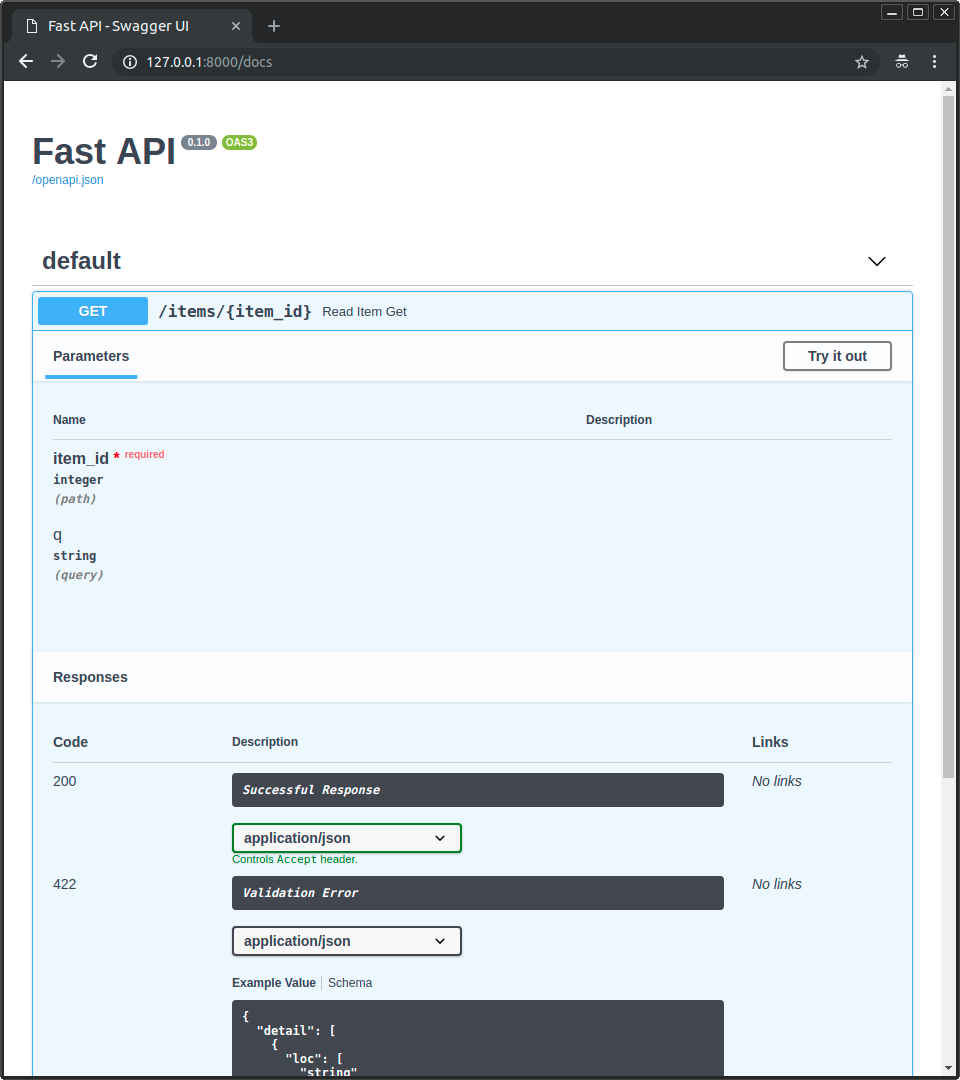
|
||
|
||
### Alternative API docs
|
||
|
||
And now, go to <a href="http://127.0.0.1:8000/redoc" class="external-link" target="_blank">http://127.0.0.1:8000/redoc</a>.
|
||
|
||
You will see the alternative automatic documentation (provided by <a href="https://github.com/Rebilly/ReDoc" class="external-link" target="_blank">ReDoc</a>):
|
||
|
||
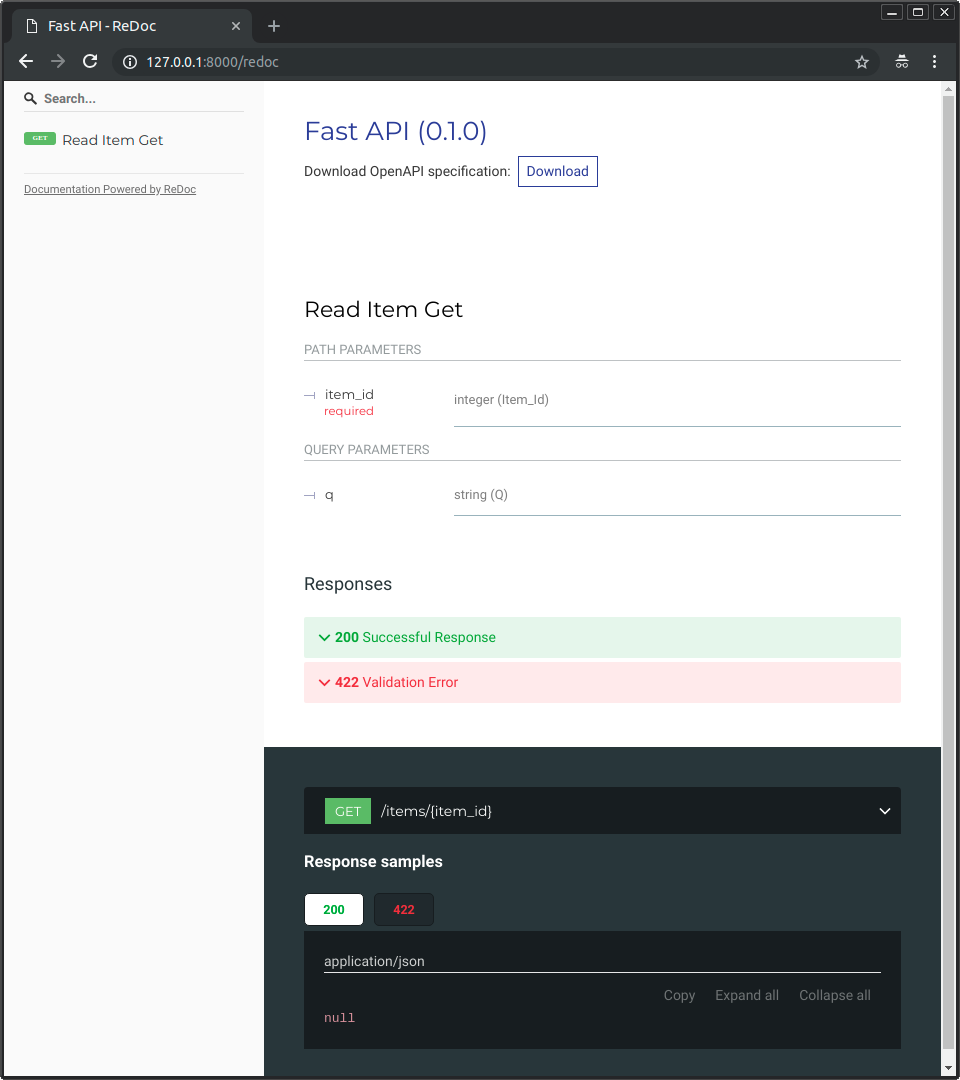
|
||
|
||
## Example upgrade
|
||
|
||
Now modify the file `main.py` to receive a body from a `PUT` request.
|
||
|
||
Declare the body using standard Python types, thanks to Pydantic.
|
||
|
||
```Python hl_lines="4 9-12 25-27"
|
||
from typing import Union
|
||
|
||
from fastapi import FastAPI
|
||
from pydantic import BaseModel
|
||
|
||
app = FastAPI()
|
||
|
||
|
||
class Item(BaseModel):
|
||
name: str
|
||
price: float
|
||
is_offer: Union[bool, None] = None
|
||
|
||
|
||
@app.get("/")
|
||
def read_root():
|
||
return {"Hello": "World"}
|
||
|
||
|
||
@app.get("/items/{item_id}")
|
||
def read_item(item_id: int, q: Union[str, None] = None):
|
||
return {"item_id": item_id, "q": q}
|
||
|
||
|
||
@app.put("/items/{item_id}")
|
||
def update_item(item_id: int, item: Item):
|
||
return {"item_name": item.name, "item_id": item_id}
|
||
```
|
||
|
||
The `fastapi dev` server should reload automatically.
|
||
|
||
### Interactive API docs upgrade
|
||
|
||
Now go to <a href="http://127.0.0.1:8000/docs" class="external-link" target="_blank">http://127.0.0.1:8000/docs</a>.
|
||
|
||
* The interactive API documentation will be automatically updated, including the new body:
|
||
|
||
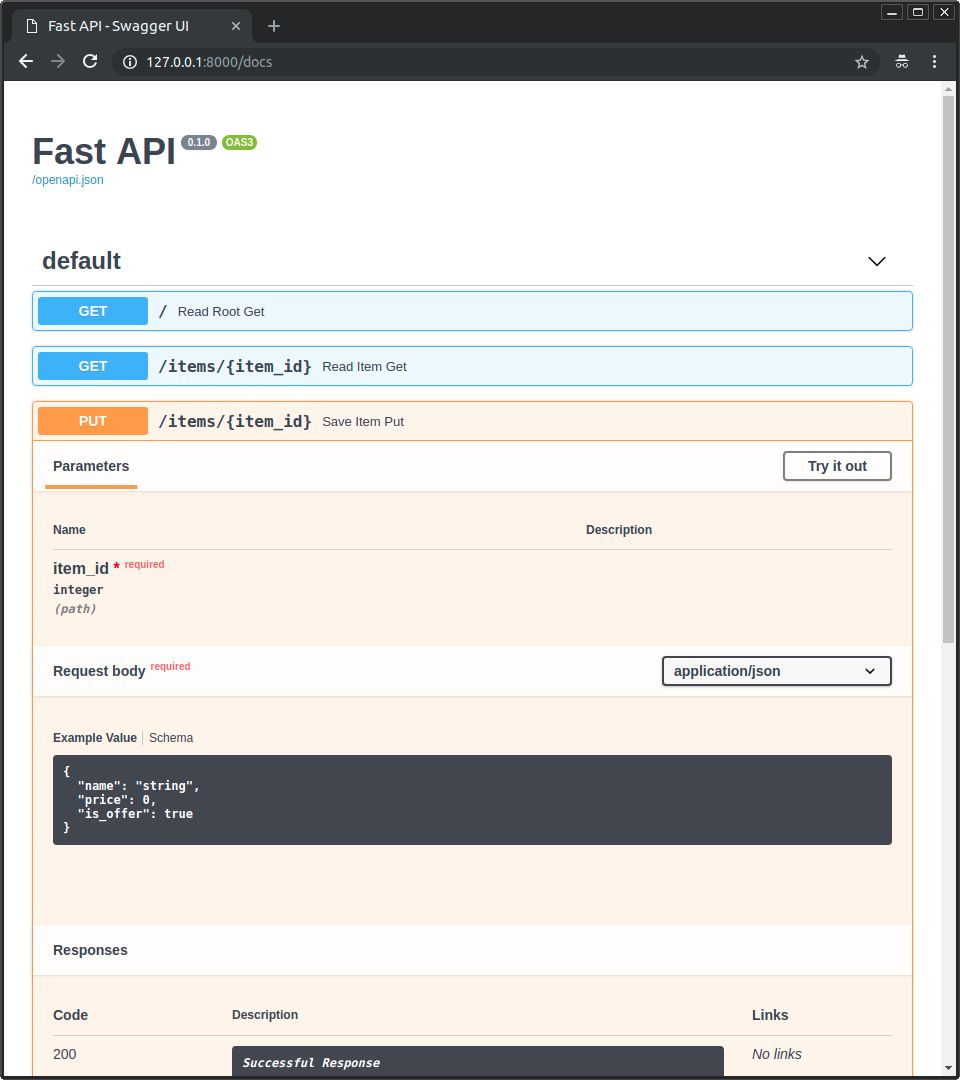
|
||
|
||
* Click on the button "Try it out", it allows you to fill the parameters and directly interact with the API:
|
||
|
||
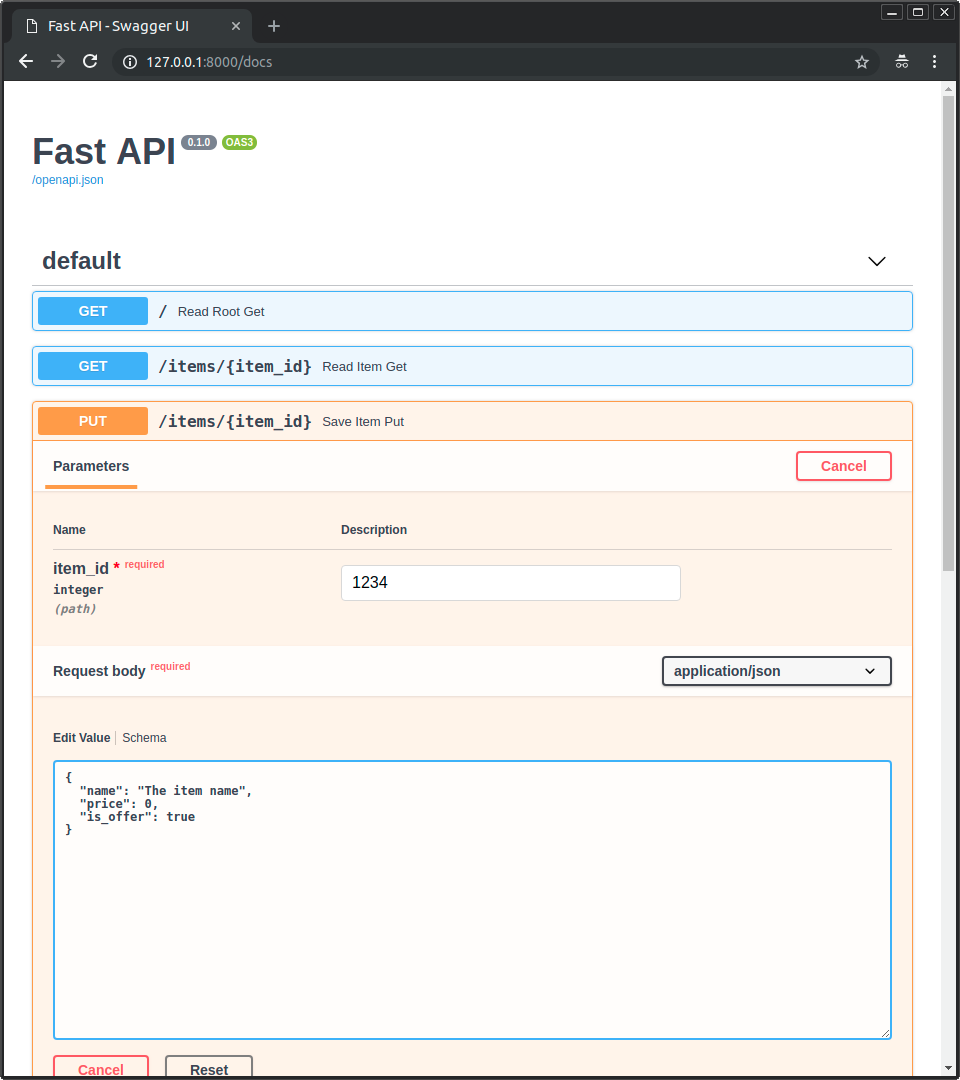
|
||
|
||
* Then click on the "Execute" button, the user interface will communicate with your API, send the parameters, get the results and show them on the screen:
|
||
|
||
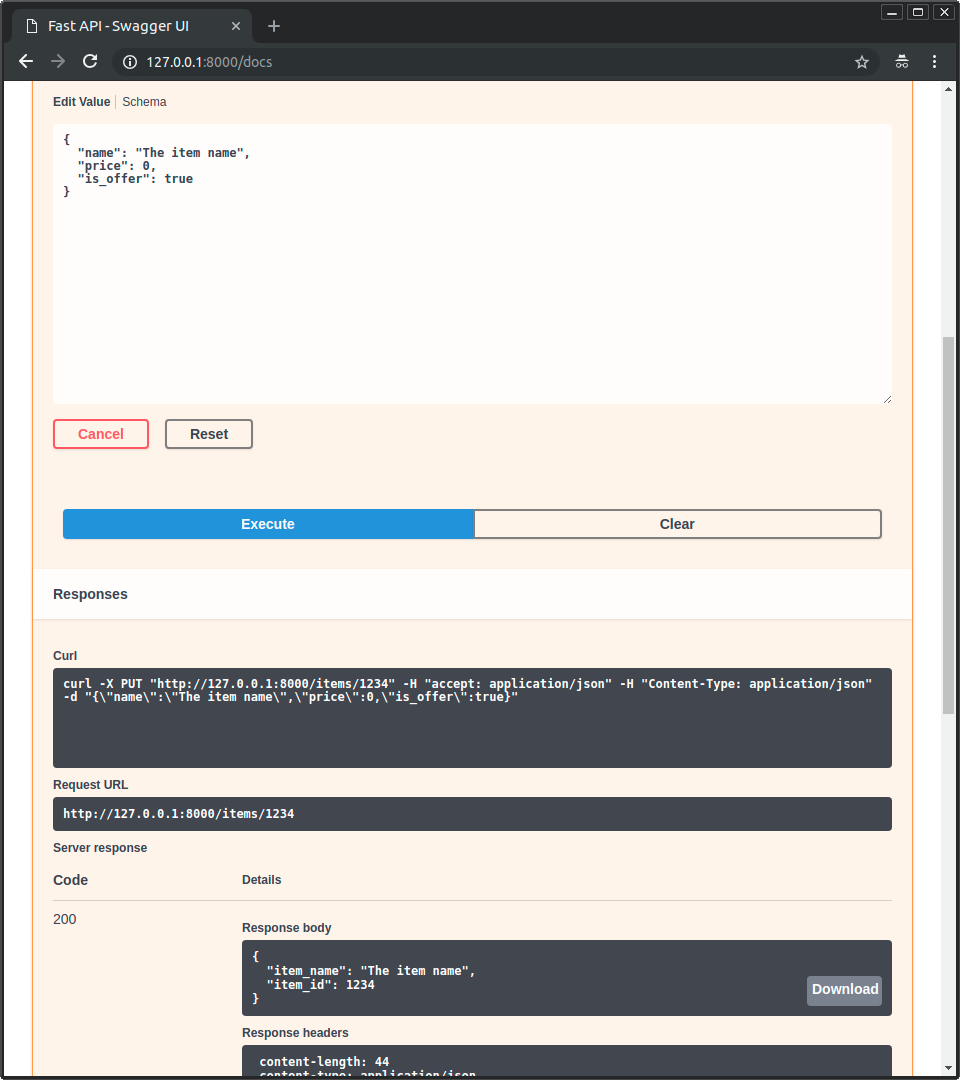
|
||
|
||
### Alternative API docs upgrade
|
||
|
||
And now, go to <a href="http://127.0.0.1:8000/redoc" class="external-link" target="_blank">http://127.0.0.1:8000/redoc</a>.
|
||
|
||
* The alternative documentation will also reflect the new query parameter and body:
|
||
|
||
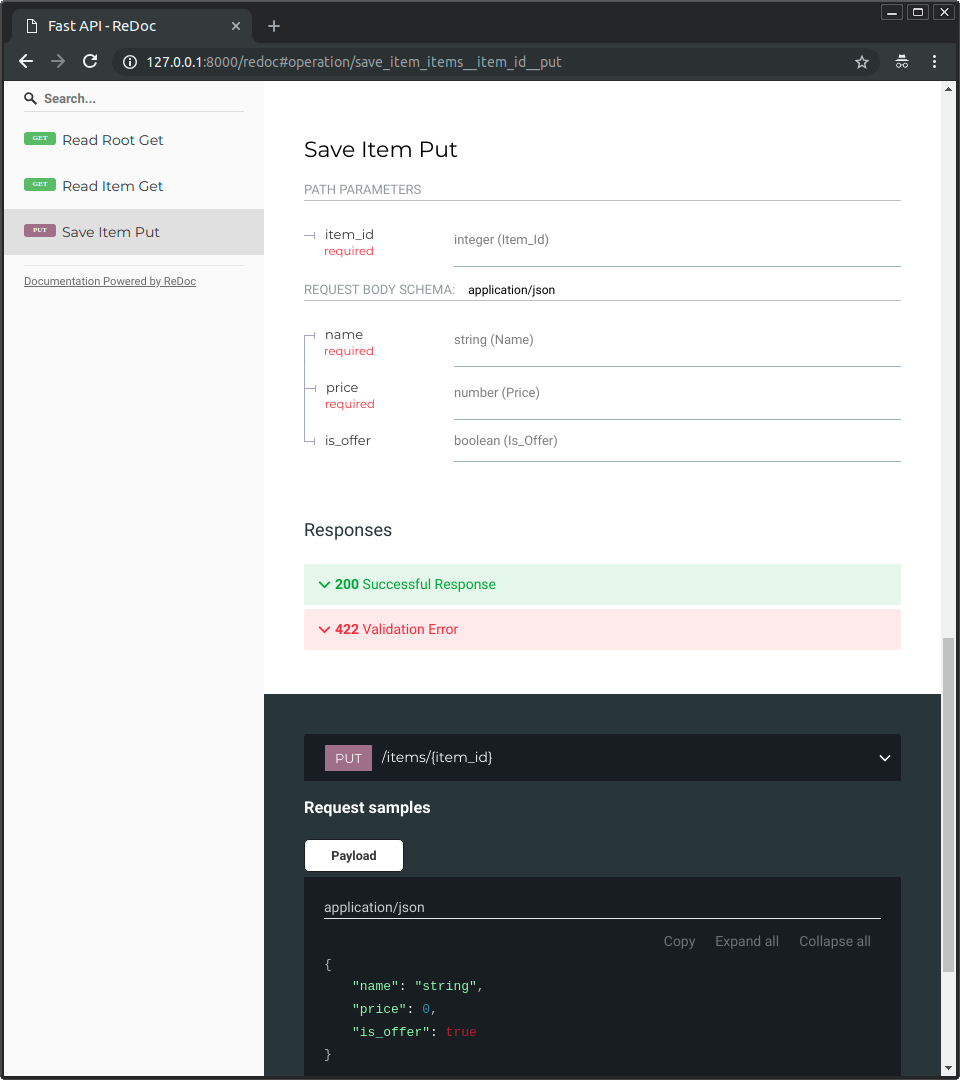
|
||
|
||
### Recap
|
||
|
||
In summary, you declare **once** the types of parameters, body, etc. as function parameters.
|
||
|
||
You do that with standard modern Python types.
|
||
|
||
You don't have to learn a new syntax, the methods or classes of a specific library, etc.
|
||
|
||
Just standard **Python**.
|
||
|
||
For example, for an `int`:
|
||
|
||
```Python
|
||
item_id: int
|
||
```
|
||
|
||
or for a more complex `Item` model:
|
||
|
||
```Python
|
||
item: Item
|
||
```
|
||
|
||
...and with that single declaration you get:
|
||
|
||
* Editor support, including:
|
||
* Completion.
|
||
* Type checks.
|
||
* Validation of data:
|
||
* Automatic and clear errors when the data is invalid.
|
||
* Validation even for deeply nested JSON objects.
|
||
* <abbr title="also known as: serialization, parsing, marshalling">Conversion</abbr> of input data: coming from the network to Python data and types. Reading from:
|
||
* JSON.
|
||
* Path parameters.
|
||
* Query parameters.
|
||
* Cookies.
|
||
* Headers.
|
||
* Forms.
|
||
* Files.
|
||
* <abbr title="also known as: serialization, parsing, marshalling">Conversion</abbr> of output data: converting from Python data and types to network data (as JSON):
|
||
* Convert Python types (`str`, `int`, `float`, `bool`, `list`, etc).
|
||
* `datetime` objects.
|
||
* `UUID` objects.
|
||
* Database models.
|
||
* ...and many more.
|
||
* Automatic interactive API documentation, including 2 alternative user interfaces:
|
||
* Swagger UI.
|
||
* ReDoc.
|
||
|
||
---
|
||
|
||
Coming back to the previous code example, **FastAPI** will:
|
||
|
||
* Validate that there is an `item_id` in the path for `GET` and `PUT` requests.
|
||
* Validate that the `item_id` is of type `int` for `GET` and `PUT` requests.
|
||
* If it is not, the client will see a useful, clear error.
|
||
* Check if there is an optional query parameter named `q` (as in `http://127.0.0.1:8000/items/foo?q=somequery`) for `GET` requests.
|
||
* As the `q` parameter is declared with `= None`, it is optional.
|
||
* Without the `None` it would be required (as is the body in the case with `PUT`).
|
||
* For `PUT` requests to `/items/{item_id}`, Read the body as JSON:
|
||
* Check that it has a required attribute `name` that should be a `str`.
|
||
* Check that it has a required attribute `price` that has to be a `float`.
|
||
* Check that it has an optional attribute `is_offer`, that should be a `bool`, if present.
|
||
* All this would also work for deeply nested JSON objects.
|
||
* Convert from and to JSON automatically.
|
||
* Document everything with OpenAPI, that can be used by:
|
||
* Interactive documentation systems.
|
||
* Automatic client code generation systems, for many languages.
|
||
* Provide 2 interactive documentation web interfaces directly.
|
||
|
||
---
|
||
|
||
We just scratched the surface, but you already get the idea of how it all works.
|
||
|
||
Try changing the line with:
|
||
|
||
```Python
|
||
return {"item_name": item.name, "item_id": item_id}
|
||
```
|
||
|
||
...from:
|
||
|
||
```Python
|
||
... "item_name": item.name ...
|
||
```
|
||
|
||
...to:
|
||
|
||
```Python
|
||
... "item_price": item.price ...
|
||
```
|
||
|
||
...and see how your editor will auto-complete the attributes and know their types:
|
||
|
||
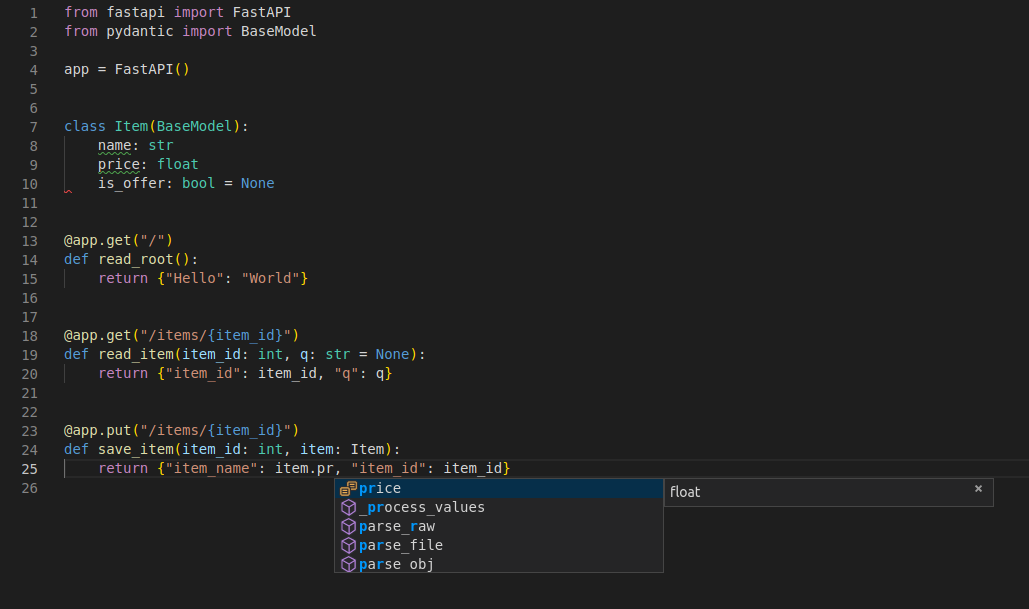
|
||
|
||
For a more complete example including more features, see the <a href="https://fastapi.tiangolo.com/tutorial/">Tutorial - User Guide</a>.
|
||
|
||
**Spoiler alert**: the tutorial - user guide includes:
|
||
|
||
* Declaration of **parameters** from other different places as: **headers**, **cookies**, **form fields** and **files**.
|
||
* How to set **validation constraints** as `maximum_length` or `regex`.
|
||
* A very powerful and easy to use **<abbr title="also known as components, resources, providers, services, injectables">Dependency Injection</abbr>** system.
|
||
* Security and authentication, including support for **OAuth2** with **JWT tokens** and **HTTP Basic** auth.
|
||
* More advanced (but equally easy) techniques for declaring **deeply nested JSON models** (thanks to Pydantic).
|
||
* **GraphQL** integration with <a href="https://strawberry.rocks" class="external-link" target="_blank">Strawberry</a> and other libraries.
|
||
* Many extra features (thanks to Starlette) as:
|
||
* **WebSockets**
|
||
* extremely easy tests based on HTTPX and `pytest`
|
||
* **CORS**
|
||
* **Cookie Sessions**
|
||
* ...and more.
|
||
|
||
## Performance
|
||
|
||
Independent TechEmpower benchmarks show **FastAPI** applications running under Uvicorn as <a href="https://www.techempower.com/benchmarks/#section=test&runid=7464e520-0dc2-473d-bd34-dbdfd7e85911&hw=ph&test=query&l=zijzen-7" class="external-link" target="_blank">one of the fastest Python frameworks available</a>, only below Starlette and Uvicorn themselves (used internally by FastAPI). (*)
|
||
|
||
To understand more about it, see the section <a href="https://fastapi.tiangolo.com/benchmarks/" class="internal-link" target="_blank">Benchmarks</a>.
|
||
|
||
## Dependencies
|
||
|
||
FastAPI depends on Pydantic and Starlette.
|
||
|
||
### `standard` Dependencies
|
||
|
||
When you install FastAPI with `pip install "fastapi[standard]"` it comes the `standard` group of optional dependencies:
|
||
|
||
Used by Pydantic:
|
||
|
||
* <a href="https://github.com/JoshData/python-email-validator" target="_blank"><code>email-validator</code></a> - for email validation.
|
||
|
||
Used by Starlette:
|
||
|
||
* <a href="https://www.python-httpx.org" target="_blank"><code>httpx</code></a> - Required if you want to use the `TestClient`.
|
||
* <a href="https://jinja.palletsprojects.com" target="_blank"><code>jinja2</code></a> - Required if you want to use the default template configuration.
|
||
* <a href="https://github.com/Kludex/python-multipart" target="_blank"><code>python-multipart</code></a> - Required if you want to support form <abbr title="converting the string that comes from an HTTP request into Python data">"parsing"</abbr>, with `request.form()`.
|
||
|
||
Used by FastAPI / Starlette:
|
||
|
||
* <a href="https://www.uvicorn.org" target="_blank"><code>uvicorn</code></a> - for the server that loads and serves your application. This includes `uvicorn[standard]`, which includes some dependencies (e.g. `uvloop`) needed for high performance serving.
|
||
* `fastapi-cli` - to provide the `fastapi` command.
|
||
|
||
### Without `standard` Dependencies
|
||
|
||
If you don't want to include the `standard` optional dependencies, you can install with `pip install fastapi` instead of `pip install "fastapi[standard]"`.
|
||
|
||
### Additional Optional Dependencies
|
||
|
||
There are some additional dependencies you might want to install.
|
||
|
||
Additional optional Pydantic dependencies:
|
||
|
||
* <a href="https://docs.pydantic.dev/latest/usage/pydantic_settings/" target="_blank"><code>pydantic-settings</code></a> - for settings management.
|
||
* <a href="https://docs.pydantic.dev/latest/usage/types/extra_types/extra_types/" target="_blank"><code>pydantic-extra-types</code></a> - for extra types to be used with Pydantic.
|
||
|
||
Additional optional FastAPI dependencies:
|
||
|
||
* <a href="https://github.com/ijl/orjson" target="_blank"><code>orjson</code></a> - Required if you want to use `ORJSONResponse`.
|
||
* <a href="https://github.com/esnme/ultrajson" target="_blank"><code>ujson</code></a> - Required if you want to use `UJSONResponse`.
|
||
|
||
## License
|
||
|
||
This project is licensed under the terms of the MIT license.
|